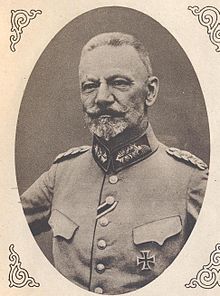Loading AI tools
German general during World War I From Wikipedia, the free encyclopedia
Max Karl Wilhelm von Gallwitz (2 May 1852 – 18 April 1937) was a German general from Breslau (Wrocław), Silesia, who served with distinction during World War I on both the Eastern and Western Fronts.[1][2]
Max von Gallwitz | |
|---|---|
 Gallwitz on 13 July 1915 | |
| Born | 2 May 1852 Breslau, Province of Silesia, Kingdom of Prussia (now Wrocław, Republic of Poland) |
| Died | 18 April 1937 (aged 84) Naples, Kingdom of Italy (now Naples, Republic of Italy) |
| Allegiance | |
| Service | |
| Years of service | 1870–1918 |
| Rank | General |
| Commands | Guards Reserve Corps Twelfth Army Eleventh Army Second Army Fifth Army Army Group Gallwitz |
| Battles / wars | Franco-Prussian War World War I |
Gallwitz grew up in a Catholic family in Breslau and joined the Prussian Army in 1870. In 1891, he married Friedrike. They had a daughter and son Werner, who became a lieutenant general in the Second World War. Gallwitz was a First World War corps commander (Guards Reserve Corps) on the Western Front, but he was almost immediately transferred east to join the Eighth Army under Hindenburg.[1] In 1915, he took command of Armee-Gruppe Gallwitz[3] (later redesignated Twelfth Army) and participated in the Galicia offensive alongside Mackensen, who commanded the Eleventh Army.[4]
Towards the end of 1915, Gallwitz succeeded Mackensen as commander of the Eleventh Army, as the latter campaigned against Serbia. In 1916, he moved back to the Western Front and defended against the British attack in the Battle of the Somme. He took over command of 2nd Army and of Heeresgruppe Gallwitz - Somme[5] controlling the 1st and 2nd Armies. From 1916–18, he commanded the Fifth Army in the west, most notably engaging the Americans during the Battle of Saint-Mihiel.
Following his retirement from the army, Gallwitz served as a deputy in the Reichstag (1920–24) for the German National People's Party.[4]
Seamless Wikipedia browsing. On steroids.
Every time you click a link to Wikipedia, Wiktionary or Wikiquote in your browser's search results, it will show the modern Wikiwand interface.
Wikiwand extension is a five stars, simple, with minimum permission required to keep your browsing private, safe and transparent.